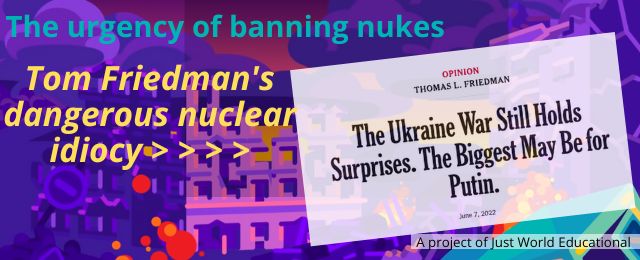In his New York Times column today, TomFriedman expresses concern that the NATO-wide support that the campaign against Russia in Ukraine has enjoyed until now may be eroding: “One can already see signs of this in the statement by President Emmanuel Macron of France on Saturday that the Western alliance must ‘not humiliate Russia‘ — a statement that elicited howls of protest from Ukraine,” he writes.
But he brings in one of his oft-favored experts, Michael Mandelbaum, to buttress his argument that this must not be allowed to happen. And he (Friedman) argues that even if the war should bring “a year or two of astronomical gasoline and heating oil prices” this might not be such a bad thing, since this would further push the industrialized nations towards the use of renewables.
There is indeed a lot to unpack in this argument. (Does he really think the “West” can withstand a year or two of astronomical fuel prices?) But the kicker comes at the end of the piece, where in the jocular tone he often adopts, he write: “Go figure: If this war doesn’t inadvertently blow up the planet, it might inadvertently help sustain it.”
Think about it. Here’s a guy who claims to be an “expert” on international relations and is often treated as such by members of the Blob here in Washington, who feels he can write with near-complete insouciance about the possibility of planetary destruction through nuclear war.
Earlier in the piece, he had quoted his close buddy Mandelbaum as having noted that in the Civil War and World War II, the U.S. goal was total victory over the enemy. But then, with apparent approval, he quotes Mandelbaum as adding, “The problem for Biden and our allies is that we cannot aim for total victory over Putin’s Russia, because that could trigger a nuclear war — yet something like total victory may be the only way to stop Putin from just bleeding Ukraine forever.”
Friedman does not at that point add that there is, of course, a clear alternative to “total victory” in Ukraine, which would be a negotiated settlement to the conflict there (that should also start to put in place a much more robust Europe-wide security architecture than anything that has existed there until now.)
So what has happened to the Tom Friedman who just a month ago was writing, “Let’s be careful not to raise Ukrainian expectations too high. Small countries that suddenly get the backing of big powers can get intoxicated. Many things have changed about Ukraine since the end of the Cold War — except one: its geography. It is still, and it will always be, a relatively small nation on Russia’s border. It is going to have to make some hard compromises before this conflict is over. Let’s not make it even harder for it by adding unrealistic goals.” Or, a couple of days later, this: “Ukraine was, and still is, a country marbled with corruption. That doesn’t mean we should not be helping it. I am glad we are. I insist we do. But my sense is that the Biden team is walking much more of a tightrope with Zelensky than it would appear to the eye — wanting to do everything possible to make sure he wins this war but doing so in a way that still keeps some distance between us and Ukraine’s leadership. That’s so Kyiv is not calling the shots and so we’ll not be embarrassed by messy Ukrainian politics in the war’s aftermath… “
Well, I guess what happened was this: On May 16, Tom Friedman went to lunch in the White House at Pres. Biden’s invitation. It seems to have been a one-on-one affair; and six days later Friedman couldn’t help but brag about it a little bit, very coyly, in his column: “[I]t was all off the record — so I can’t tell you anything he said. I can, though, tell you two things — what I ate and how I felt after.”
What he felt after was, indeed, pretty admiring. He wrote glowingly that Biden, “just put NATO together, Europe together and the whole Western alliance together — stretching from Canada up to Finland and all the way to Japan — to help Ukraine protect its fledgling democracy from Vladimir Putin’s fascist assault… It has been the best performance of alliance management and consolidation since another president whom I covered and admired — who also was said to be incapable of putting two sentences together: George H.W. Bush.”
The insouciant way in which Tom Friedman referred today to the possibility of nuclear war is extremely dangerous– and made even more so by the sheer number of people in powerful positions in Washington today who, like Friedman, seem to have little understanding of nuclear risks and nuclear realities.
Tom Friedman, remember, won his spurs in the foreign-policy punditocracy after working as the NYT’s Middle East correspondent for a number of years. That was his prime expertise. (I remember when he first came to Beirut, working for UPI, back in the mid-1970s, and the rest of us journos who were already there helped to show him the ropes…) But the Middle East was the core of any deep expertise he had. Afterwards, he came back to Washington in around 1990, to head up the NYT’s State Department coverage. But he never seemed to gain any depth of understanding into the issues and nuances involved in the first Pres. Bush’s pretty expert negotiation of an end to the Cold War: Mainly, at the time, Friedman was still working on the important Middle East dimensions of the State Department’s policymaking.
So I guess that must have been how he could write those jocular words he wrote today– “Go figure: If this war doesn’t inadvertently blow up the planet, it might inadvertently help sustain it.”

